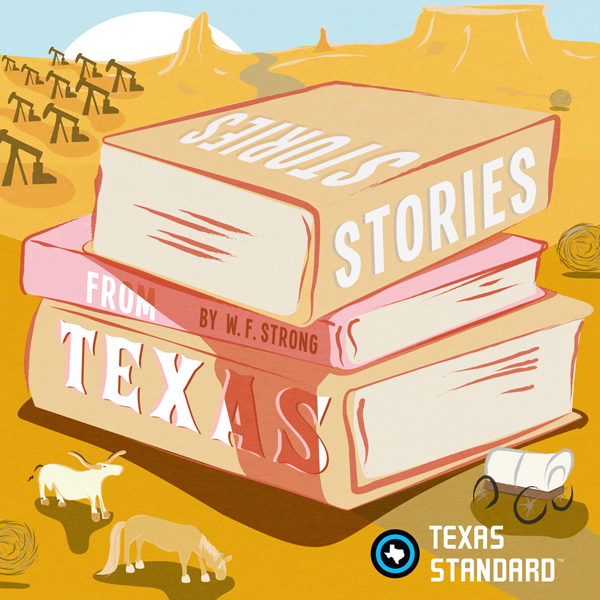This bit of history really does seem too strange to be true. It involves the family of John Wilkes Booth, the son of Abraham Lincoln, and Sam Houston.
The full transcript of this episode of Stories from Texas is available on the KUT & KUTX Studio website. The transcript is also available as subtitles or captions on some podcast apps.
WF Strong [00:00:00] Sal from Fort Worth sent me a letter in which he advised that I should look into the story of how the Bowery Theatre in New York City back in 1836 raised money for the Texas Revolution. Sal is 98 years old and I am grateful that he is still an avid student of history and took the time to write. Thank you, Sal. I pursued your lead vigorously and I found historical gold. Let’s begin here on a roundabout way to the Bowery Theatre. Robert Todd Lincoln was nearly killed in 1835 when he almost fell off a train platform in New Jersey. He was saved by the strong arm of Edwin Booth, who grabbed him by his coat collar and pulled him to safety. Edwin booth saved the life of Robert Lincoln. If that fact sounds strangely familiar to you, It is because of another fact. More firmly rooted in your memory that upstages it. A year after this event, John Wilkes Booth, Edwin’s brother, would assassinate Abraham Lincoln, Robert’s father. The two events were not connected except by randomness. Our story today has more of these coincidences that occur so frequently in history that they seem almost miraculous. As you may know, Edwin Booth and John Wilkes Booth were both actors but Edwin was considered the finest of his era. Edwin and John’s father Junius Brutus Booth was before that considered the finest actor of his time. Walt Whitman loved his mastery of the stage. In senior Booth’s time he was a passionate supporter of the Texas Revolution. He was known to use his Shakespearean trained voice to mount tables and bars in New York City to explain at length to the patrons. Just why they should support the Texas Revolution against Mexico. In January of 1836, he convinced Thomas Hamblin, the manager of the Bowery theater, where he was primarily headlining plays in those days to host some fundraising evenings under the heading of a triumph for Texas, a GoFundMe of the 19th century. They raised money by putting on the play Venice Preserve. Booth plays Pierre, who is a headstrong revolutionary, giving speeches about the need to overthrow dictators in the name of God-given freedom, speeches not unlike those that were soon to be delivered at the Alamo and San Jacinto. The question that begs to be asked here is how did Junius Booth develop such a love for Texas all the way from New York City and given that he was British by birth? It turns out that he knew Sam Houston personally, from Houston’s early days as a U S congressman from Tennessee. Booth frequently performed in the theaters in Washington, DC, and they became, as we would say today, drinking buddies. Booth even coached Houston on his oratorical style to make him a more effective congressional orator. Naturally, some years later, when Booth was aware that Houston was in Texas endeavoring to overthrow Santa Anna, he wanted to help. He did what he could to rally national sentiment for the Texas cause from the stage of the Bowery Theater and from tabletops and bars, where he sold patrons on the righteous cause of Texas freedom. When Sam Houston returned to Washington as a Texas Senator in 1846, he and Booth again rekindled their bromance and commenced bar hopping on occasion. Once again, here is a description of the two of them in those days. When in Washington, Junius Brutus Booth and General Sam Houston of Texas were great cronies. It was a picture worthy of punch to see this eccentric pair take their afternoon promenade along Pennsylvania Avenue. Houston stood six feet, four inches and booth about five feet, five inches. As it was winter, Houston’s ample shoulders were covered with a large gray blanket that reached to his heels. His grizzled head was mounted by a huge Mexican sombrero. Booth was fashionably attired in a brown long skirted overcoat with buttons high up in the small of his back and his classic head held up a high crowned silk hat. And thus they marched. Little Booth, clinging to the arm and with difficulty, keeping pace with the sturdy strides of the hero of San Jacinto. They were on pleasure bent and were soon lost to view of the amused pedestrians. Oh, I would have loved to have seen that. I’m WFStrong. These are stories from Texas by way of New York and Washington DC. Some of them are true.
This transcript was transcribed by AI, and lightly edited by a human. Accuracy may vary. This text may be revised in the future.





